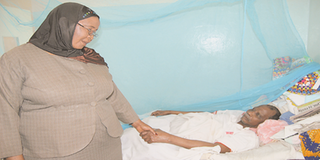Rejected, lonely and trapped in a hospital bed for 45 years

Social worker Zuhura Karya visits Mzee Lanjui in hospital in Singida. PHOTO | VENANCE NESTORY
What you need to know:
His mother was gone, the treatment was unsuccessful and everything that could go wrong did so. Isaya was sent back home, still unwell.
Singida. Abdi Lanjui, 75, probably holds the world record for staying in hospital longer than any other person.
Lying there, he has plenty of time to reflect on his life. “I have a son,” he tells me with a smile.
He left his home village, Muhintiri, in 1962 and went to Mwanza in search of a better life. “Part of having a good time away from home was the women,” he laughs.
He recalls one who was special. His only regret was that he did not marry her, even though she was the mother of his son Jumanne Abdi.
Tatu Athumani was her name.
He adds: “When Tatu realised that I would probably never walk again, she left me. I didn’t think I would live long so I never fought for my son. I often wonder where they are. Are they alive? I wonder where my son is and what he has become. What must my son be thinking—that his father died long ago? I still remember him. I hope he reads this, and finds me.”
Birds of a feather...
Lanjui’s typical day is spent on his back and chatting with his friend, Isaya Selemani. Selemani was born in 1969, the year Lanjui had the accident.
He was born in Kikonge Village in Iramba District in Singida. He is now 45 and has been in hospital since July 7, 1995.
“It was on a Monday,” Selemani recalls, as if he has written it down in his mind. He is on his wheelchair and smiles most of the time.
Isaya is the last of five children born to Selemani and Shillah.
His feet suddenly became weak in 1992, when he was just 22. He was taken to a traditional healer and stayed there for a year.
His mother died the same year while he was undergoing treatment at the traditional healer’s home. “I never said goodbye to her,” he says. “I wish I had seen her one more time.”
He smiles a lot and speaks softly even though nothing in his life appears to have gone his way.
His mother was gone, the treatment was unsuccessful and everything that could go wrong did. Isaya was sent back home, still unwell.
He started walking with a cane in 1994. His health kept deteriorating and, in 1995, a neighbour took him to hospital in Singida town for further treatment.
He has been there ever since. His father passed away in 1997 and, one by one, all his siblings died.
Zuhura Karya, the social welfare officer in Singida, appears unfamiliar with the details of the case. She says, though, that this matter could have been resolved.
Isaya says he could do with the three-wheeled auto rickshaw, known as Bajaj, so he can run his life independently. “He just needs to be empowered to do this,” Karya says.
But Dr Joseph Malunada, the medical officer in charge at Singida Regional Hospital, believes that they did their best for both Isaya and Mzee Lanjui.
He also feels that since they receive misaada—help from good Samaritans—the hospital seems like a convenient place to be.
Lanjui takes comfort in having Isaya around—and his radio, of course. There are many things all over his bed and just above his head.
The collection includes clothes, a knitted table cloth, boxes, newspapers, hot pots, a thermos, spoons, plates, a scissor, plaster and a radio.
He considers the radio a friend that keeps him up to speed on what is going on in the world. He listens to Bunge sessions keenly.
Lanjui adds: “I hear them talking about government plans to help people living with disability. I wonder what they are talking about. When are these plans going to start? I have been lying here for 45 years. When is this aid going to reach me?”
He also listens to the radio to forget his problems. “What else can you do when you are confined this way?” he asks.
He shows me bandages on his bed and his head. He will be dressing himself soon. He has wounds all over his body. He pulls away the bed sheet and shows them to me.
They are red and open, all over his body from waist down. He shows me a dent on the right side of his lower abdomen. He got it from the accident.
“There are many people who have come to see me. Europeans, students, even Chinese doctors,” he recalls.
“I remember a Chinese doctor who said they could have helped me had they been there at the time of the accident but it was too late now. My nerves were dead already.”
Dr Malunda is skeptical about such claims. “When nerves are damaged, they are damaged,” he says. “There is nothing we could have done for these patients, medically. This needs to be understood.”
Abdi Lanjui has not always stuck to his bed. He used to have a life, even inside the hospital. It wasn’t until about a year and a half ago that he started getting worse.
The wounds were not healing and they spread to his backside. They itch a lot. That is why he cannot sit on a wheelchair any more.
Mzee Lanjui says that a doctor here told him that he needs to go to Kilimanjaro Christian Medical Centre (KCMC), where they have the right facilities to cure his wounds.
But Dr Joseph Malunada, the medical officer in charge at Singida Regional Hospital, says that management of bed sores is similar everywhere and many have recovered at this hospital.
“Bed sores may heal and break out again if the cause is still the same--in this case being bedridden,” he adds.
“This is not the first time Mzee Lanjui is getting and recovering from sores. Referring him to KCMC or anywhere else just because of bed sores will be frustrating for both patient and the facility.”
Besides, the hospital specialist in skin diseases has not yet seen the need to refer the patient. “The doctor said I have to take myself there,” says Mzee Lanjui. “I think it is because of the food.”
The food factor
Mzee Lanjui claims that when it became obvious that he would not be going home soon, the hospital stopped feeding him.
“The nurses are very kind though,” he says. “I can’t say that I have ever gone hungry.”
When he has money, he sends a nurse to get him his lunch at noon. This is his only meal, unless someone volunteers to buy him breakfast or dinner.
Dr Malunda explains that the hospital administration reviewed the general provision of food to all admitted patients in line with their social welfare needs in 2011.
The new focus was to ensure food was available during medical emergencies and for patients most in need. This new focus applied to all patients and not just Mzee Lanjui.
The old man has always had food, though, whether from the hospital or other sources and that is why his basic nutritional status has remained good for all these years.
“Mzee Lanjui is neither malnourished nor overweight,” explains Dr Malunda. “If he was not eating, he would have died long ago or become malnourished.”
The hospital tracks all patients and cases that are in need of social support, including food, on a daily basis and reports them to the hospital administration for action, Dr Malunda adds, and it is virtually impossible for Mr Lanjui to have ever gone hungry.
Survival skills
Back in the days when Abdi Lanjui could sit, he learnt a few survival skills. He was suicidal when he first came to the hospital back in 1971 and especially after his parents died, says Justina Ngaiza, a retired social worker.
Ms Ngaiza was there when Lanjui was brought in. He eventually accepted his condition, she recalls, after a series of counselling sessions.
Mzee Lanjui recalls how—in the late 70s—Catholic nuns taught him and another patient, Christina, how to knit.
He remembers their kindness and how great his knitting was. “I made the best baby socks and hats that you have ever seen,” he says, laughing.
The social welfare department in Singida gave him capital and he started making cloth. Not only was his fabric the best in all of Singida, he says, it brought him an income. It made him independent and gave him purpose.
But things have changed now. A milky white ring has formed around his iris and Mzee Lanjui says he cannot see well. He does not want to prick his fingers as he knits.
Cleaning up
From the right side of the bed, he brings out a bedpan. He hasn’t had a proper shower in a long while and uses a small towel to wipe himself clean.
Ms Karya says that the whole social system needs to be cleaned up—to change.
She explains that when they realised that Mzee Lanjui had nowhere to go, the hospital wanted to send him to a nearby centre for lepers.
The centre also accepts other complicated cases like Mzee Lanjui’s. But Ms Karya declined the offer.
“If he had gone there, he would be dead by now. He wouldn’t receive the proper care that he needed. Although care isn’t that good here, trust me, it is worse there,” says Ms Karya who has been a social worker for more than 30 years.
“We see lepers going to the roadside to beg. These are people who could walk and in a way take care of themselves. What do you think would have happened to Mzee Lanjui if he went there? It would have been fatal.”
Dr Malunda is of the opinion that medical care and social welfare services have always been provided to Mzee Lanjui when they are available.
However, social welfare needs are very broad and may touch various ranges of human aspects and personalities.
He adds: “We hope your contribution to this case (in writing this article) may result in more social support in order to make Mr Lanjui feel better.”
What Ms Karya would like to see is shelter for people like Mzee Lanjui. “The government should build what I would like to call Home of Peace. It is not just Mzee Lanjui who needs such a home,” she says.
“Elderly women who are being killed in Shinyanga and Mwanza would also find security in such homes.”
When other people in the room have left, Mzee Lanjui calls me and pulls the turquoise mosquito net aside.
He looks me in the eye and says: “Nisaidie. Nisaidie mama yangu, nateseka. (Help me. Help me my mother, I’ m suffering.)”
His voice is almost breaking and he is clearly desperate for a kind word. Without giving it second thought, I do what he expects me to: I console him. “Pole baba, Pole.”




